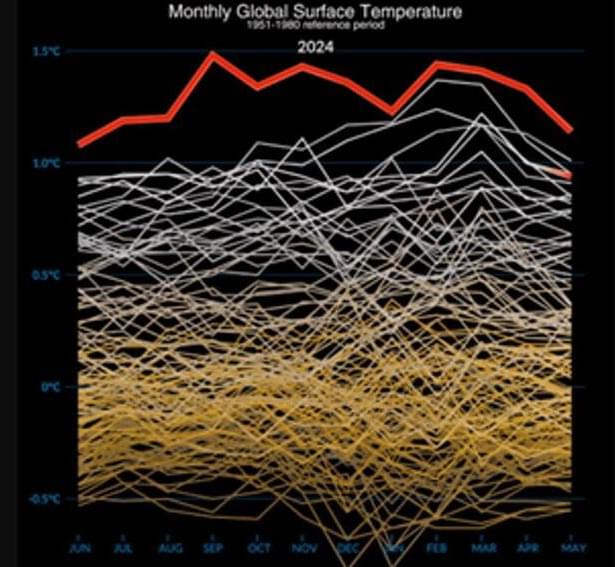Jun 12, 2024
Every Month For The Last Year Has Been The Hottest Ever Recorded
Posted by Dan Breeden in category: futurism
May 2024 was the hottest May on record, marking a full annual cycle of monthly records, the longest ever recorded.

May 2024 was the hottest May on record, marking a full annual cycle of monthly records, the longest ever recorded.
In research published earlier this year, physicists from the University of Hyderabad in India say they’re on the path to solving one of the universe’s biggest outstanding problems. Since Edwin Hubble realized the universe is always expanding nearly 100 years ago, scientists have used the “Hubble constant” in calculations on virtually every scale in the universe. But today, estimates for the Hubble constant don’t always align, with a difference of up to 10 percent between calculations made using different methods. (When someone at NASA mixes up meters and yards and loses an entire spacecraft, that’s not even a full 10 percent deviation.)
The paper appears in the peer reviewed journal Classical and Quantum Gravity. The journal has an ongoing, periodically updated “focus issue” specifically about this measurement tension, and the editors explain the problem there—scientists can’t say for sure that the different Hubble constants measured are actually different, rather than just observation or calibration issues.
When it comes to quantum computing, that chilling effect on research and development would enormously jeopardize U.S. national security. Our projects received ample funding from defense and intelligence agencies for good reason. Quantum computing may soon become the https://www.cyberdefensemagazine.com/quantum-security-is-nat...at%20allow, codebreaking%20attacks%20against%20traditional%20encryption" rel="noopener" class="">gold standard technology for codebreaking and defending large computer networks against cyberattacks.
Adopting the proposed march-in framework would also have major implications for our future economic stability. While still a nascent technology today, quantum computing’s ability to rapidly process huge volumes of data is set to revolutionize business in the coming decades. It may be the only way to capture the complexity needed for future AI and machine learning in, say, self-driving vehicles. It may enable companies to hone their supply chains and other logistical operations, such as manufacturing, with unprecedented precision. It may also transform finance by allowing portfolio managers to create new, superior investment algorithms and strategies.
Given the technology’s immense potential, it’s no mystery why China committed what is believed to be more than https://www.mckinsey.com/featured-insights/sustainable-inclu…n-quantum” rel=“noopener” class=””>$15 billion in 2022 to develop its quantum computing capacity–more than double the budget for quantum computing of EU countries and eight times what the U.S. government plans to spend.
Prototype quantum photonic-dimer laser uses entanglement to bind photons and deliver a powerful beam of concentrated light that can shine through adverse weather like thick fog.
From Stanford & Chan Zuckerberg Biohub TextGrad Automatic “Differentiation” via Text.
From stanford & chan zuckerberg biohub.
TextGrad.
Continue reading “TextGrad: Automatic ‘Differentiation’ via Text” »
The Prompt Report.
A systematic survey of prompting techniques.
Sander schulhoff, michael ilie, nishant balepur, konstantine kahadze, amanda liu, chenglei si, yinheng li, aayush gupta, hyojung han, sevien schulhoff, pranav sandeep dulepet, saurav vidyadhara,…
Continue reading “The Prompt Report: A Systematic Survey of Prompting Techniques” »
When compressed, nanoribbons of titanium and sulfur can change properties dramatically, turning into materials with the ability to conduct electricity without losing energy, according to a study published in the journal Nano Letters.
When molecules are irradiated with infrared light, they begin to vibrate due to the energy supply. For Andreas Hauser from the Institute of Experimental Physics at Graz University of Technology (TU Graz), this well-known phenomenon was the starting point for considering whether these oscillations could also be used to generate magnetic fields.
Scientists think that helium hydride is the universe’s first chemical bond, yet the ion has proven surprisingly difficult to locate.
4.5.24 Silvia Cernea Clark 713−348−6728 silviacc@rice.edu.
Chris Stipes 713−348−6778 chris.stipes@rice.edu.
